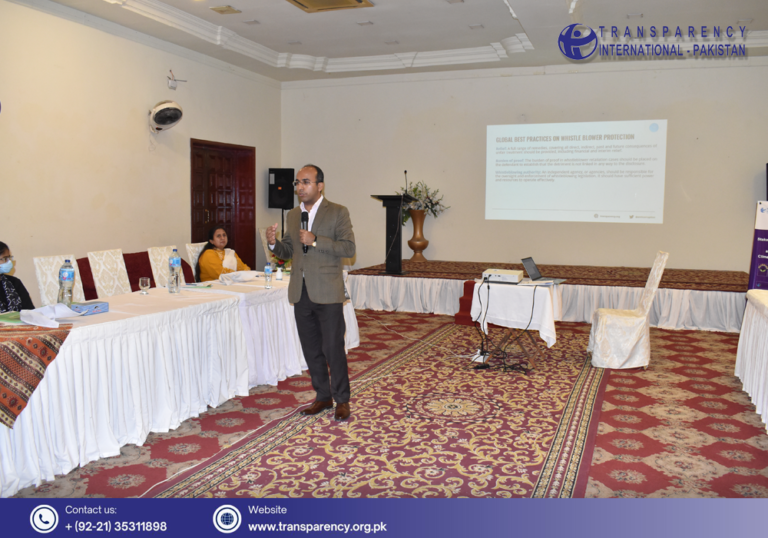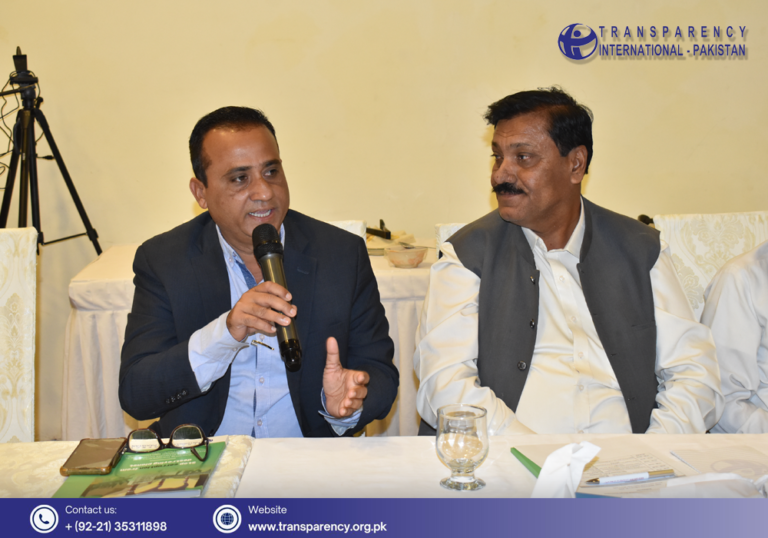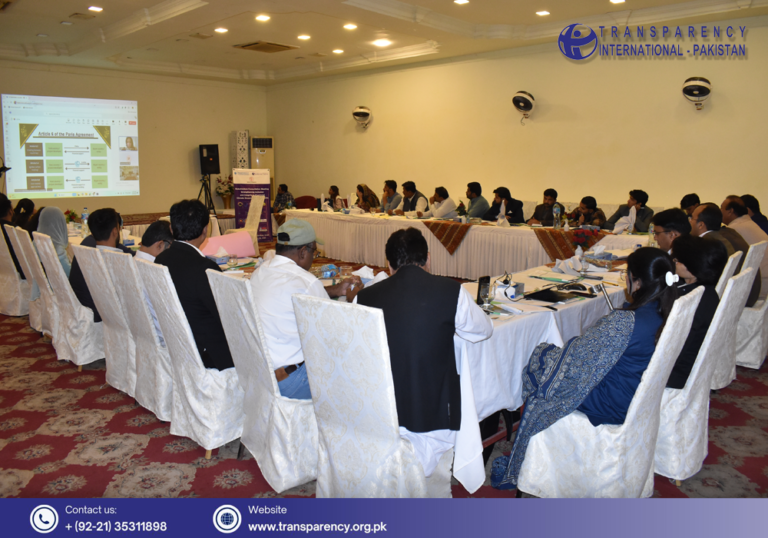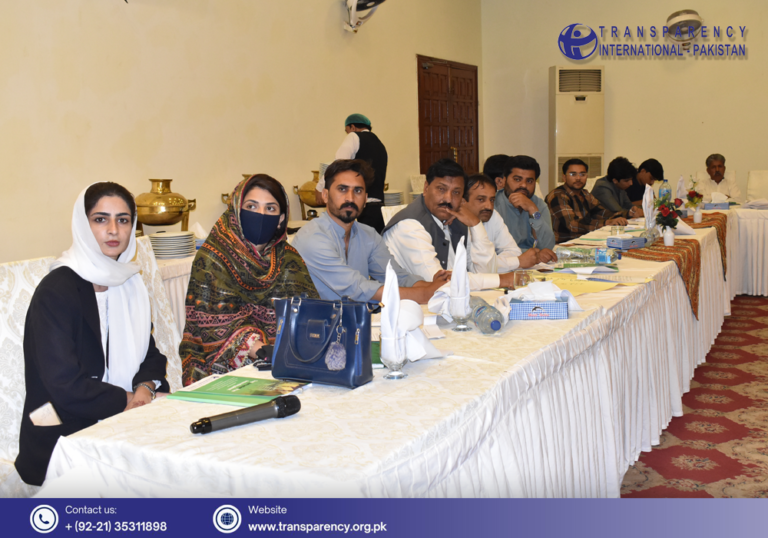CSOs Stakeholders Consultation Meeting: Strengthening Inclusion and Integrity in Provincial Climate Governance Frameworks
CSOs Stakeholders Consultation Meeting: Strengthening Inclusion and Integrity in Provincial Climate Governance Frameworks
Venue: Indus Hotel, Hyderabad, Sindh
Date: Wednesday, February 26, 2025
Transparency International Pakistan organized Civil Society Stakeholders Consultation Meeting titled “Strengthening Inclusion and Integrity in Provincial Climate Governance Frameworks” on Wednesday, February 26, 2025 at Hyderabad, Sindh. The event brought together TI Pakistan Sindh Civil Society Network on Transparent and Inclusive Climate Governance established in May 2023.
The consultation meeting was attended by 33 representatives (07 female and 26 male) representing 27 civil society organizations from 18 climate vulnerable districts of Sindh. The consultation meeting was also attended by the Federal Ministry of Climate Change and Environmental Coordination (MoCC&EC) and the Provincial Disaster Management Authority (PDMA) Sindh.
The yearly CSO consultation focused on strengthening civil society input towards enhancing integrity in carbon markets in Pakistan and the provincial inclusive disaster response plan (PIDRP) for Sindh. The network also highlighted concerns over delay in the enactment of the whistleblower protection law and conflict of interest regulation, which is key to ensure climate action in the province is transparent and equitable.
Ms. Fariha Fatima, Assistant Project Coordinator, TI Pakistan welcomed the participants and highlighted key achievements of the provincial CSO network since its inception in May 2023. She highlighted that TI Pakistan’s provincial networks have been instrumental in driving integrity and inclusion in climate governance in the country. She shared that many institutions which have remained non-operational under Climate Change Act 2017 (such as Climate Change Authority) are now established due to civil society advocacy. Through CSO networks, TI Pakistan has contributed towards ensuring integrity measures are incorporated in Balochistan’s first climate change policy and Pakistan first policy guidelines on trading in carbon markets. She also highlighted that the province of Sindh is in the process of finalizing Provincial Inclusive Disaster Response Plan (PIDRP), it is important that civil society voices are included in the policy framework and communities’ participation at the local level is ensured. She encouraged participants to provide their recommendations so that a collective civil society input can be provided to the provincial government.
Next, Mr. Kashif Ali, Executive Director, TI Pakistan, delivered a presentation on Strengthening Social Accountability for Effective Climate Governance in Sindh. He described the role of the United Nations Convention against Corruption (UNCAC) in defining and addressing corruption in climate governance, particularly through its provisions on public procurement (Article 9), duty to report (Article 17), protection of whistleblowers (Article 22), and improper use of public funds (Article 29). Mr. Ali highlighted that the absence of whistleblower protection laws in Pakistan at the federal and provincial levels is a major concern. Currently, Khyber Pakhtunkhwa (KP) is the only province that has enacted Whistleblower Protection & Vigilance Commission Act 2016, however, the Act’s implementation remains weak as KP has not yet established the mandated Whistleblower Protection & Vigilance Commission.
He emphasized that it is imperative that the whistleblower protection legislation includes safe and inclusive reporting channels, multiple reporting mechanisms, protection against lawsuits, and penalties for retaliation. He highlighted that establishing an independent whistleblowing authority with enforcement powers is a crucial step toward strengthening transparency in climate governance. Mr. Ali also highlighted the urgent need to enforce Conflict of Interest regulation for climate finance. He said that Transparency International defines CoI as a situation where an individual or organization must choose between their official duties and private interests. He highlighted various measures to regulate conflicts of interest, including prohibition of dual employment in government and private sectors, mandatory disclosure of financial assets and affiliations, and disciplinary actions for undisclosed conflicts.
Afterwards, a breakout activity was held where participants worked in groups to prepare draft recommendations for Sindh Whistleblower Protection Act and Conflict of Interest regulation. Participants identified crucial areas such as the need for a safe and secure environment for whistleblowers, ensuring confidentiality, protection from retaliation, time bound for the commission to resolve all complaints within 30 days, as well as ensuring that the commission includes at least one representative from the civil society.
Moving on, Ms. Sana Rasool, Carbon Market Specialist, Ministry of Climate Change and Environmental Coordination (MoCC&EC) gave a comprehensive presentation on “Policy Landscape for Carbon Markets in Pakistan: Safeguard for Transparency and Community Participation”. She informed the participants that Pakistan has enormous potential for carbon market projects, with an estimated 100 million tons of CO₂ credits available, generating more than $500 million in economic opportunity. She said that the high accreditation costs and the absence of national accrediting agencies pose significant challenges to market accessibility. She also highlighted that MoCC&EC is striving to establish local accreditation bodies to streamline the certification process. Ms. Sana pointed out that carbon credit transactions require government authorization to ensure compliance, transparency, and integrity in the market. There are integrity risks in Voluntary Carbon Markets (VCM) and Pakistan must ensure high integrity and high-quality credits to maintain trust and confidence of different stakeholders.
Next, Ms. Raima Mahmood, Policy and Research Coordinator, TI Pakistan discussed Carbon Markets landscape in Sindh and CSO Oversight. She highlighted that Sindh’s growing carbon market presents opportunities for climate finance and sustainable development, but strong oversight is crucial. While describing carbon markets, she informed that companies that emit excess carbon must purchase credits, while projects like reforestation, renewable energy, and methane capture generate credits. The Paris Agreement (2015) introduced a global framework for carbon trading under Article 6, allowing countries to collaborate in reducing emissions through market-based and non-market-based mechanisms.
She said that Pakistan, identified as one of the most climate-vulnerable nations, faces a $348 billion funding gap by 2030 for climate adaptation, disaster resilience, and renewable energy projects. Pakistan introduced its National Climate Finance Strategy at COP29, seeking increased international financial support. Despite its potential for a 24 million-ton CO₂ reduction, Pakistan’s carbon market faces challenges such as limited transparency, and greenwashing risks (selling fake or ineffective carbon credits).
Ms. Raima emphasized that CSOs play a crucial role in ensuring transparency in carbon credit markets by verifying emission reductions, identifying greenwashing, and advocating for stronger regulations. Their oversight helps maintain credibility and prevents market manipulation.
However, she also highlighted persistent risks such as fraudulent credits, weak enforcement, and carbon leakage. Additionally, the lack of technical expertise limits the effectiveness of CSO interventions. To achieve genuine climate impact, she stressed the need for stronger governance frameworks, enhanced capacity building, and independent monitoring mechanisms.
The next speaker was Mr. Kashan Munir, GIS Developer, Provincial Disaster Management Authority (PDMA) Sindh. He gave detailed presentation on the working of the provincial disaster management body, different tools it utilizes for multi-hazard vulnerability and risk assessment. He emphasized that PDMA approach to disaster resilience focuses on improving preparedness, response, and recovery mechanisms across the province. He also shared that a critical component of this approach is the Disaster Management Information System (DMIS), which serves as a centralized digital platform for real-time hazard monitoring, disaster risk assessment, and emergency coordination. He highlighted the need for strengthening institutional coordination, integrating DRR strategies into government policies, and improving community resilience through training and awareness programs.
Afterwards, an open discussion was held to draft recommendations for Sindh’s first Inclusive Disaster Response Plan and carbon market projects in the province. The meeting highlighted an urgent need for policy reforms, legal protections, and robust monitoring mechanisms to ensure fair, accountable, and inclusive climate governance in the province. Addressing corruption risks, enacting whistleblower protections, and enforcing conflict of interest laws will strengthen Pakistan’s ability to manage climate finance responsibly, ensuring that climate action efforts are equitable, transparent, and effective.
















